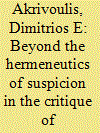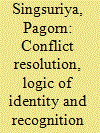| Srl | Item |
| 1 |
ID:
151638


|
|
|
|
|
| Summary/Abstract |
Realist and Marxist critiques of humanitarian intervention are distinctively materialistic in scope. The IR literature has already described this scepticism as a ‘hermeneutics of suspicion’, a term associated with the work of Paul Ricoeur, which aims to unearth the intervenors’ material and geopolitical interests hypocritically hidden behind the pretext of humanitarianism. The article first notes the decontextualised misappropriations of the term as an iconic and omnipotent instrument of doubt, as well as the limitations of the social constructivist response on the matter. By contextualising Ricoeur’s hermeneutics of suspicion as developed in his life work, the article then calls for an extension of critique from a hermeneutics of suspicion to a hermeneutics of naïveté. Applied in the critique of the ideology of humanitarian intervention, the article thus calls for a shift of focus from the examination of the distorting (Marxism, realism) and legitimising (social constructivism) functions of this ideology to its integrating function that has allowed the evocation of humanitarian principles as international norms, and uncritically vindicates this arrangement. The article proposes that this hermeneutical detour could allow critique to proceed to a greater analytical depth, opening up a set of critical questions.
|
|
|
|
|
|
|
|
|
|
|
|
|
|
|
|
| 2 |
ID:
144298


|
|
|
|
|
| Summary/Abstract |
This article analyzes various presuppositions behind the principle of absolute openness, which the philosophers of difference hold as the general principle of conflict resolution. Close attention is paid to the issue of identity. To prevent and resolve conflicts, these philosophers propose that others should be recognized by letting them be themselves. In agreement with works on conflict resolution by scholars from other disciplines such as cognitive and social psychology, sociology, anthropology and international relations, these philosophers see the process of identification as critical to understanding antagonism. They analyze this process using the logic of identity, which leads to the principle of absolute openness. It is shown through Paul Ricoeur's philosophy that the presuppositions underlying their understanding of the logic of identity are problematic. Ricoeur's idea of recognition through narrative is then explored and suggestions of how it may help resolve identity conflicts are discussed.
|
|
|
|
|
|
|
|
|
|
|
|
|
|
|
|